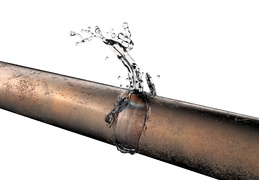How is the plumbing in your home right now? You’ll probably answer with something like, “It’s fine, no complaints.” That’s good! But it might not be accurate.
Many problems that affect residential plumbing don’t show outward signs until they’re advanced, and because most of the pipes in a home are hidden from sight, it’s often difficult to notice when issues like leaks and corrosion are starting.
We want to help see that your plumbing in Atlanta really falls into the “no complaints” category. Today, we’re going to look at a sneaky plumbing problem that often gets past people’s attention until it becomes an expensive issue—pinhole leaks.
What Are Pinhole Leaks?
Pinhole leaks are tiny, almost imperceptible leaks that occur in copper pipes. These leaks start as minuscule holes that can be challenging to detect without specialized equipment. Pinhole leaks are typically caused by a combination of factors, including corrosion, chemical reactions in the water, and the age of the plumbing system.
Common Causes of Pinhole Leaks:
- Corrosion: Over time, the inner walls of copper pipes can corrode due to chemical reactions between the water and the metal.
- Water Chemistry: High levels of chlorine or a low pH balance in your water can accelerate the deterioration of pipes.
- Age of Pipes: Older pipes are more susceptible to developing pinhole leaks, especially if they haven’t been properly maintained.
- Environmental Factors: The quality of water, soil conditions, and the overall environment in which the pipes are installed can influence the likelihood of pinhole leaks developing.
Why Pinhole Leaks Are Trouble
Pinhole leaks may seem insignificant due to their small size, but they can lead to significant damage over time. Here’s why they’re problematic:
- Water Damage: Even a small, continuous leak can cause extensive water damage to walls, floors, and ceilings, leading to costly repairs.
- Mold Growth: The damp environment created by a pinhole leak is an ideal breeding ground for mold and mildew, which can pose health risks to your family.
- Higher Water Bills: Though small, pinhole leaks can waste a substantial amount of water, leading to unexpected increases in your water bill.
- Structural Damage: Persistent leaks can weaken the structural integrity of your home, potentially leading to more severe issues down the line.
Ways to Notice Pinhole Leaks
Detecting pinhole leaks early can save you from the headaches of extensive repairs. Here are some signs to watch out for:
- Unexplained Water Spots: Look for water stains or damp patches on walls, ceilings, and floors.
- Moldy Odor: A persistent musty smell can indicate hidden water damage and mold growth.
- Decreased Water Pressure: A sudden drop in water pressure can signal a leak somewhere in your plumbing system.
- Unusually High Water Bills: An unexpected increase in your water bill can be a sign of a hidden leak.
- Sound of Running Water: If you hear water running when all taps are turned off, it could indicate a leak.
Rely on Professionals for Leak Detection
While some signs of pinhole leaks are visible, others require professional detection methods. At HM Plumbing, we have the tools and expertise to accurately locate and repair pinhole leaks before they escalate into major problems. Our team uses advanced leak detection technology to ensure your plumbing system is in top shape.
Contact HM Plumbing today for your residential plumbing needs. Serving with Integrity.

